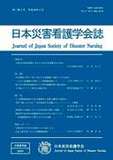Japanese
English
- 有料閲覧
- Abstract 文献概要
- 参考文献 Reference
- サイト内被引用 Cited by
要約
研究目的:2011年3月の東日本大震災に伴う福島原発事故被災者の県外避難家庭の震災直後と3年後のストレス度の増減に関連する家族形態、生活状況等の要因分析を目的とした。
研究方法:調査対象は関東への避難家庭の世帯主とし、調査期間は2014年の7ヵ月とした。無記名自記式のアンケート調査で、項目は年齢区分、性別、避難理由、避難先住居形態と家族形態、震災直後と3年後のストレス度(10段階)等、および自由記載である。解析は量的分析と質的分析を併用した。量的分析は、被災直後と3年後のストレス度差、家族形態間のストレス要因の強弱、ストレス度増減区分間の傾向をそれぞれ統計検定した。更に、ストレス度差の要因分析を重回帰分析で行った。一方、質的分析は自由記載文中のキーワード相互の関係を共起ネットワーク分析で行った。
結果:859名を対象とした。ストレス度差は有意に減少したが3割強が高水準に留まっていた。高齢者、男性、祖父母の同居および独居が、また家庭の状態がストレス度の増大要因であった。逆に官民による支援・援助の深化によりストレス度が緩和する傾向が示唆された。一方、住宅事情は特異な傾向を示し、ストレス度の増加にも、逆に減少にも強く関連していた。
結論:福島県から避難した複合被災者への支援はストレス度の多面性を考慮した、きめ細かい支援活動の必要性が示唆された。
Objective: The purpose of this study was to analyze possible stressors, such as family structure or living conditions, which influence changes in subjective stress levels over a three-year period for disaster victims who evacuated from Fukushima Prefecture after the Great East Japan Earthquake of March, 2011, and its tsunami, and nuclear accident.
Methods: Anonymous self-administered questionnaires were sent to householders of families that had evacuated to any prefectures in the Kanto region of Japan. The investigation covered seven months in 2014.
The questionnaire items were age group, gender, reason for evacuation, postevacuation type of residence and family structure, subjective stress levels in ten categories immediately after the disaster and three years later, and free-response items, etc. A mixed-methods approach was employed, incorporating both quantitative analyses and qualitative analyses of the free-response items.
Quantitative analyses: The significance of changes in stress levels during the three-year period, and trend analyses were performed using two types of statistical test.. Factor analyses regarding the changes in stress levels were carried out using multiple regression analyses.
Qualitative analyses: The relationships among key words were analyzed using the cooccurrence networks analysis.
Results: The results from 859 adult respondents revealed that stress levels decreased significantly over the three-year period, but remained high in over 30% respondents. Being elderly, being male, living with grandparents, living alone, and family conditions were the factors that correlated significantly with increased stress levels. However, the alleviation of stress resulting from governmental and private support programs was dependent on the family structure. In contrast, the housing situation of evacuees strongly contributed to both increases and decreases in stress.
Conclusion: These results indicate that thorough support activities that take into consideration the multi-faceted nature of stress are required for evacuees who currently find themselves facing a wide array of complex circumstances.
Copyright © 2016, Japan Society of Disaster Nursing All rights reserved.


